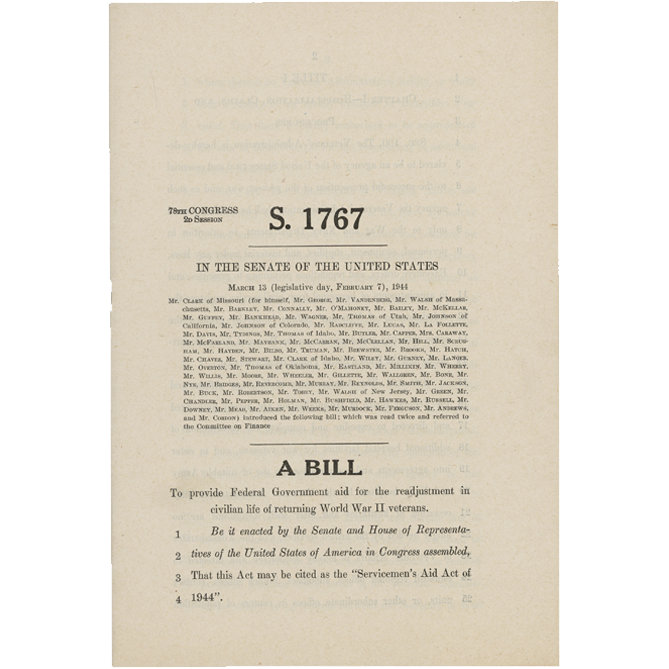Gi Bill Of Rights Definition
bill rights wallpaperLearn more about GI Bill benefits belowand how to apply for them. The benefits of the GI Bill are intended to help veterans readjust to civilian life following service to their country and to encourage bright motivated men and women to volunteer for military duty.

The Gi Bill Of Rights Definition Benefits Us History Class Study Com
The Servicemens Readjustment Act of 1944 popularly known as the GI Bill of Rights was signed by President Roosevelt on June 22 1944.

Gi bill of rights definition. Bill of Rights also called Servicemens Readjustment Act US. See Definitions and Examples Get Word of the Day daily email. The resulting legislation of the 1960s put black veterans and civilians one step closer to equal treatment under the law.
Originally the GI Bill was called the GI Bill of Rights and offered federal aid to help veterans buy homes get jobs and pursue an education. Bill is still used to refer to programs created to assist US. What is the GI Bill of Rights.
The GI Bill of Rights officially known as the Servicemens Readjustment Act of 1944 is one of the most important pieces of service-related legislation passed to help those in uniform. Test Your Vocabulary. Bill of Rights Law see Servicemens Readjustment Act.
The Servicemens Readjustment Act of 1944 commonly known as the GI. The assistance bill provided for books supplies counseling services a living allowance and of course tuition. WORD OF THE DAY.
Learn the basics about this landmark piece of legislation so you can walk around not looking dumb. See the full definition. This included money given to help pay for homes and education.
Bill of Rights was signed by President Franklin Delano Roosevelt on June 22 1944 after it had passed the House and the Senate unanimously. Government Issued Bill is one option -- get in to view more The Webs largest and most authoritative acronyms and abbreviations resource. Bill also known as the Servicemans Readjustment Act of 1944 was enacted by Congress and signed into law by former President Franklin D.
Djə ˌdʒiː aɪ ˌbɪl əv ˈraɪts also the GI Bill a US law passed in 1944 to give financial help to members of the armed forces when they returned from the Second World War. Slippery Words QuizChanging with the Times. Looking for the definition of GI BILL.
Bill of Rights Originally established to provide services and benefits to the veterans of World War II the Servicemens Readjustment Act of 1944 also known as the GI. The purpose of the 1944 GI Bill was to help retuning veterans from WW2 both men and women to make an efficient and speedy readjustment to civilian life and the economy. The GI Bill created a comprehensive package of benefits including financial assistance for higher education for veterans of US.
Since 1944 the GI Bill has helped qualifying Veterans and their family members get money to cover all or some of the costs for school or training. Click card to see definition The pay helped veterans support themselves and their families. Gi bill definition any of various Congressional bills enacted to provide funds for college educations home-buying loans and other benefits for armed-services veterans.
What is an earlier meaning of nice. Bill expired in 1956 but the term GI. Most notably the GI Bill also known as the.
GI Bill benefits help you pay for college graduate school and training programs. Have a correction or comment about this article. Gravity The bill provided one year of unemployment pay for veterans unable to find work.
On the positive side the GI. The GI Bill created a comprehensive package of benefits including financial assistance for higher education for veterans of US. Bill in full GI.
The purpose of the GI Bill of Rights was to provide government services to veterans of World War II. Roosevelt to provide various benefits to World. Bill did boost the black middle class in unprecedented ways and would pave the way for the Civil Rights Movement.
Bill of Rights is the informal name used to refer to the Servicemans Readjustment Act of 1944 which is a congressional act that provides benefits to American soldiers following the end. Legislation adopted in 1944 that provided various benefits to veterans of World War II. See the full list.
Bill was a law that provided a range of benefits for returning World War II veterans commonly referred to as GIs. The benefits of the GI Bill are intended to help veterans readjust to civilian life following service to their country and to encourage bright motivated men and women to volunteer for military duty. GI Bill is contained in 1 match in Merriam-Webster Dictionary.

